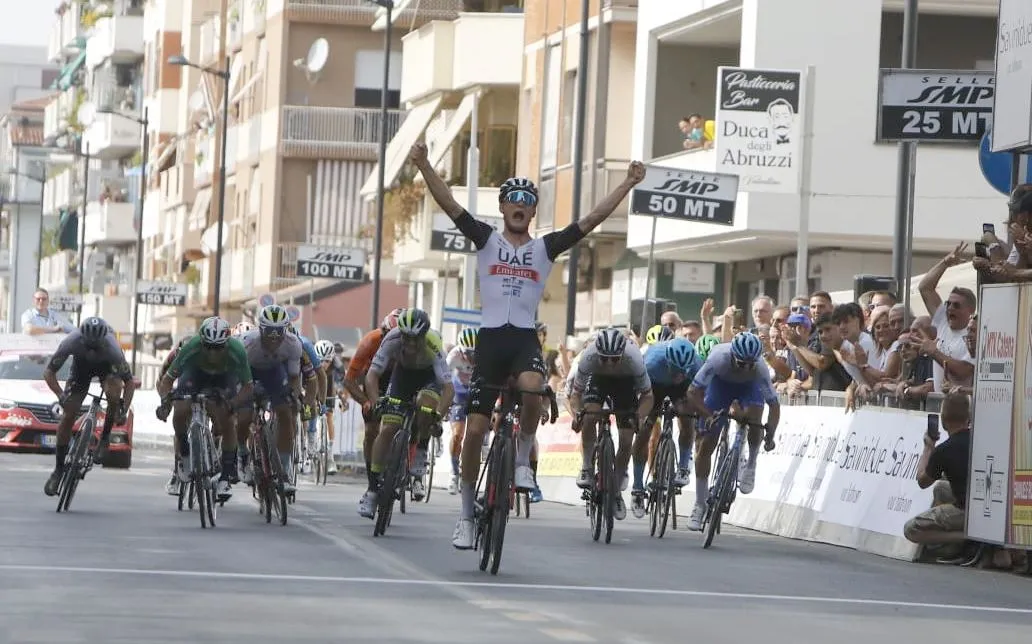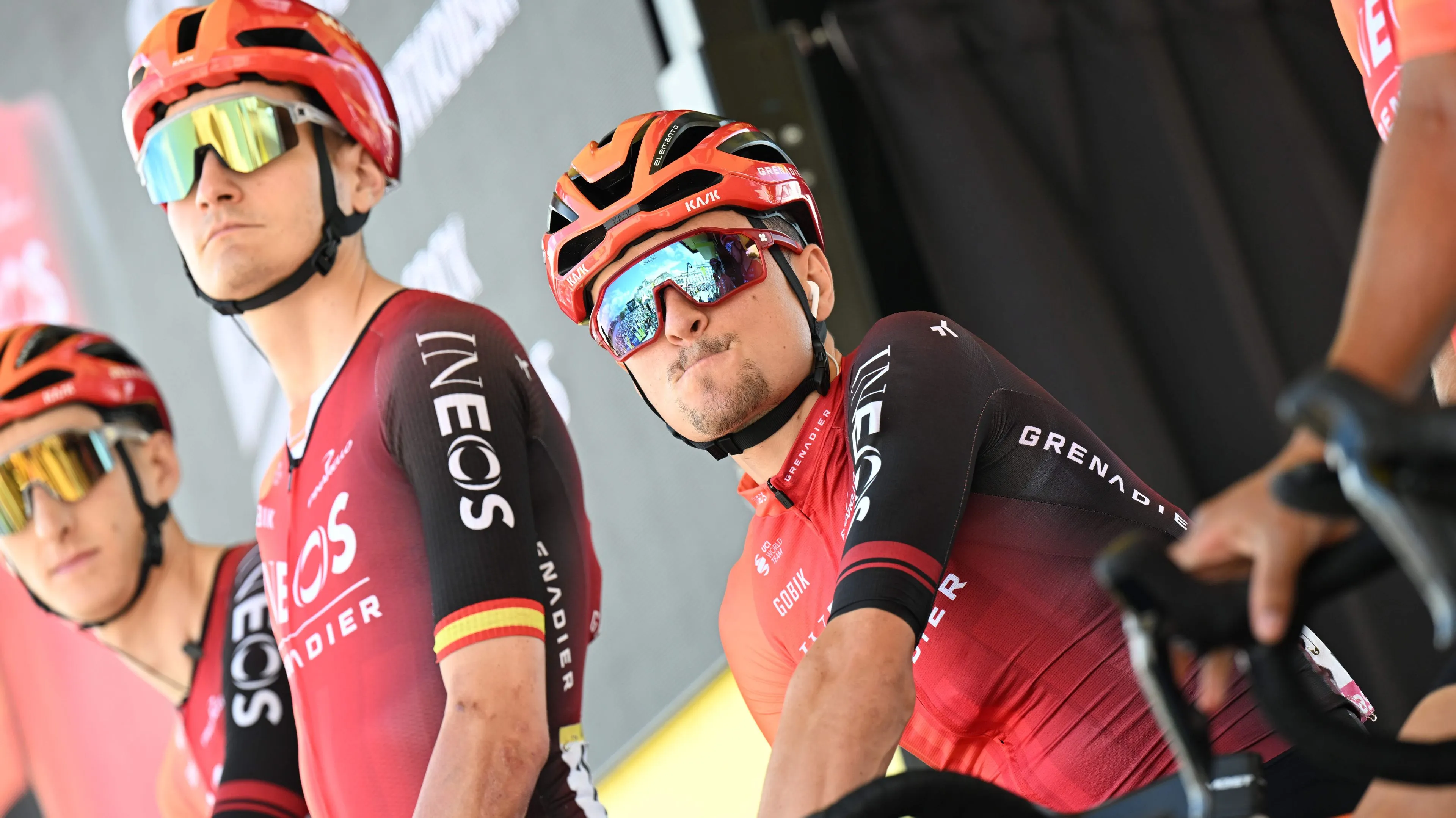Can Pogacar hold his throne? UAE's dominance in the peloton could soon face various threats
CyclingTuesday, 15 October 2024 at 09:20
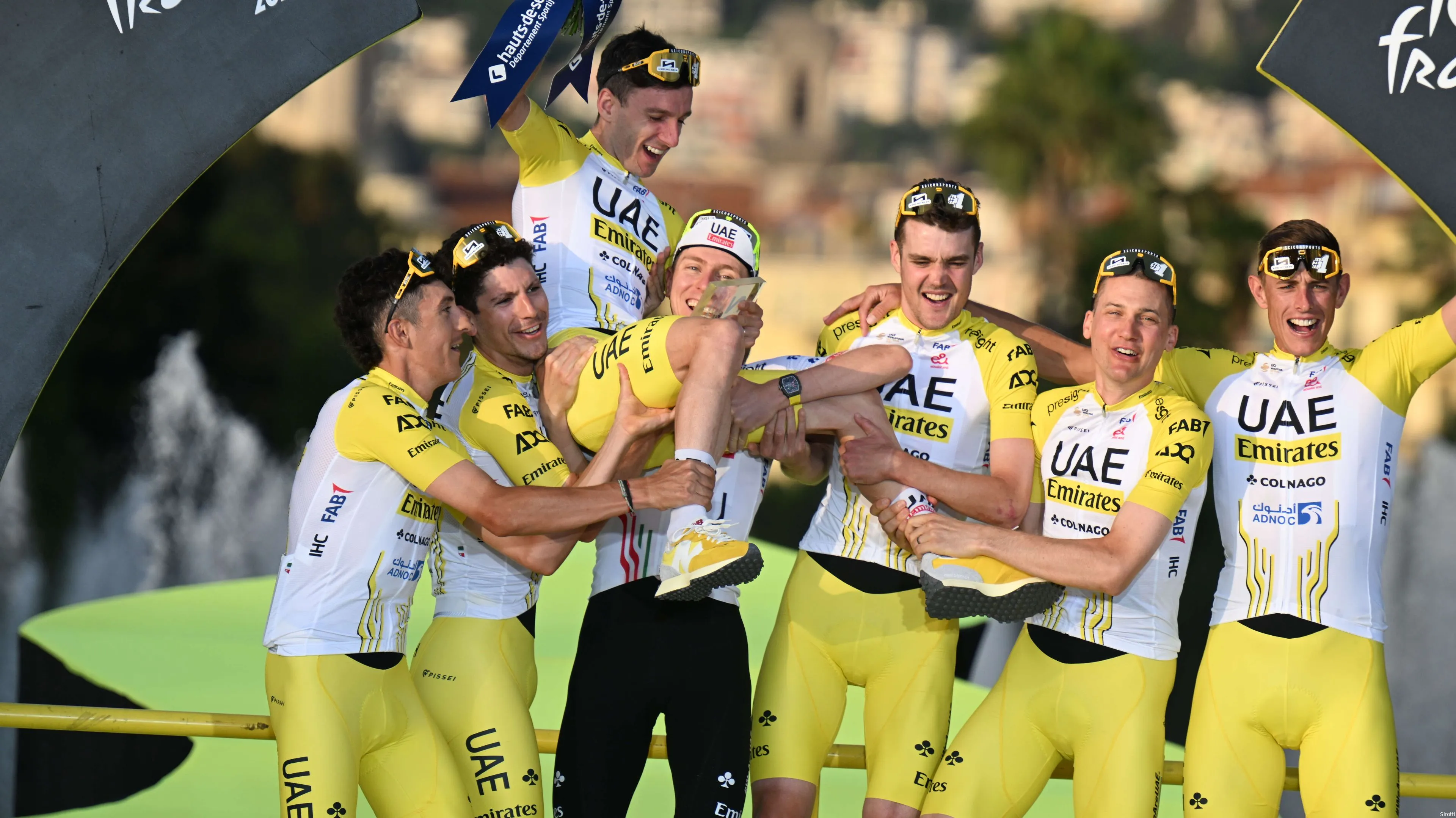
Now that the biggest races are over, the 2024 cycling season is starting to sink in. It was a season dominated by one rider in particular: Tadej Pogacar. While it was clear that the Slovenian was sharp at the start of the season, no one could have predicted the sheer extent of his dominance. The competition had anything but a flawless season, Pogacar's planning was superior, and his team had done their homework perfectly over the winter. Nine months later, this leaves one question: how will the rest of the peloton respond to such overwhelming dominance?
One might almost forget that the top teams, like UAE Team Emirates and Pogacar, who aim to win in all major races, have faced similar questions before. At the end of 2021, the cycling season's results mirrored today's: Pogacar had easily won the Tour de France and added Liège-Bastogne-Liège and the Tour of Lombardy to his resume for the first time. In particular, Jumbo-Visma, under the guidance of sporting director Merijn Zeeman, was left scratching their heads. How could they compete with such a powerhouse?
In preparation for the 2022 Tour de France, as was later shown in books and documentaries, Jumbo-Visma meticulously crafted a plan to take down the seemingly invincible Pogacar. And it worked. The Dutch team fielded Primoz Roglic and Jonas Vingegaard, Pogacar's biggest challengers at the time. They exploited his weaknesses — high altitudes, his playfulness, a less-than-perfect team, and the heat — to land a decisive blow. The story is well-known by now: Vingegaard claimed the yellow jersey on the Col de Granon and went on to win the Tour that year. By 2025, three years later, the rest of the peloton would do well to revisit this moment and craft similar plans.
Read more below the photo.
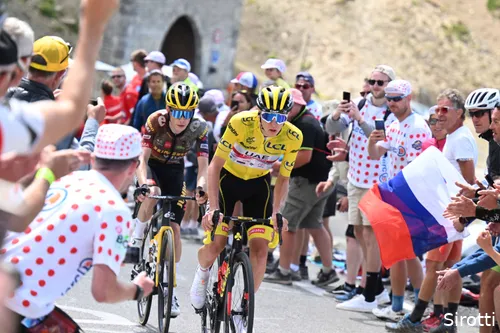
Tadej Pogacar and Jonas Vingegaard on the Galibier, the day cycling changed
It couldn't go wrong: UAE and Pogacar took two crucial lessons from Visma | Lease a Bike
That day marked the start of a new era in cycling. With carefully timed, large-scale plans, the biggest races could be turned on their heads. In 2023, UAE Team Emirates had no answer to Jumbo-Visma's formula. Vingegaard was simply too strong in that Tour de France. Even with Adam Yates as a new super-domestique, the Dane couldn’t be cracked. UAE needed a different approach — more strategic, more focused. Pogacar’s 2023 calendar was still a mess. A crash in Liège further complicated his goal to chase another Tour title, which became shaky from mid-April onward.
In 2024, Pogacar and his team applied two crucial lessons already practiced by Jumbo-Visma. First, the Tour roster needed to be as strong as possible. The more riders capable of achieving top-five finishes they could put to work for the team leader, the better. The team again selected João Almeida, Juan Ayuso and Yates. Second, Pogacar was instructed to be more selective in his race schedule, skipping smaller, unnecessary races, much like Roglic was trying to do. The Giro became a unique opportunity, with little competition, and, as Pogacar later admitted, you could even call it the ideal preparation — a 3-week "pink training camp" that left him a lot fitter leading up to the Tour than in previous years.
Pogacar's perfectly timed peak performances in Liège-Bastogne-Liège, the Giro, the Tour, the World Championship and Lombardy were amplified by the misfortunes of his competitors. Truthfully, who among the top riders didn’t face crashes in 2024? How strong would Vingegaard have been in July if his preparation had been flawless? And what about Roglic and Remco Evenepoel? The latter peaked visibly after the Tour and during the Olympics. No one could stop Pogacar from a third win in 'La Grande Boucle', but the differences wouldn’t have seemed so insurmountable for the competition. And that’s where the rest must start: by managing risks in their preparation for the biggest races, the same way UAE and Pogacar did their homework perfectly in the past. In a sense, the roles are reversing again.
Read more below the photo.
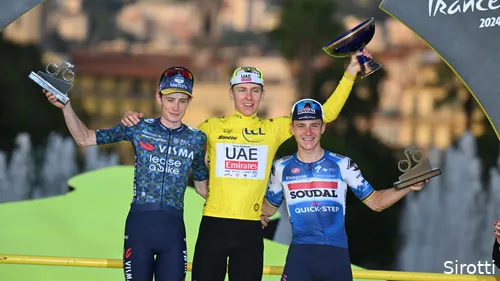
In the "what-if" category: how close would the Tour have been if the top riders had had equal preparation?
Visma | Lease a Bike, Red Bull-BORA-hansgrohe and co should let UAE Team Emirates do all the work, everywhere
Visma | Lease a Bike, Soudal Quick-Step and Red Bull-BORA-hansgrohe will now think twice when scheduling races for their top riders. The major goals are highlighted in red even more than usual, especially for the Dutch team, which will have to make big moves to truly contend in the Tour again. Not just Vingegaard but also Matteo Jorgenson, who made incredible progress in 2024, newcomer Simon Yates, and riders like Wout van Aert and Sepp Kuss must be in top form, starting in July. In principle, the Visma 'train' will have to be as strong as UAE’s was in the last Tour.
Red Bull-BORA-hansgrohe must follow suit. This season, team leader Roglic and other key riders weren’t at their best at the start in Italy. The team is still evolving. In races where Pogacar competes, the German squad must put all their cards on the table: as many top riders as possible to distract UAE. In addition to Roglic, this means Jai Hindley, Dani Martinez, Aleksandr Vlasov and Florian Lipowitz. Line them all up. In that sense, Evenepoel’s increasingly strong climbing support is promising. Despair is pointless, as there’s already a gap with Pogacar. In 2025, top teams must take more risks, going all in and updating strategies in order to enter yet another new era of cycling.
How can this play out practically? Pogacar already shows the way with his massive attacks from tens of kilometers out. In a race like Lombardy, why not launch an early offensive with all the big names on the first challenging climbs? The large breakaway group from last Saturday looked promising. What if one day Roglic, Evenepoel and maybe even Vingegaard join it? Then Pogacar will have to come up with a new strategy, too. And everyone else should let UAE Team Emirates do the heavy lifting during the race, because they are the dominant team.
Read more below the photo.
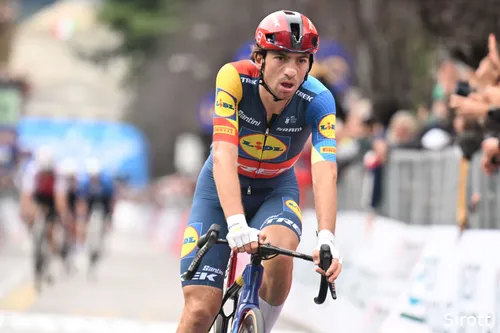
Giulio Ciccone was already searching for ways to counter Pogacar’s dominance right after Lombardy
UAE’s stronghold might start showing cracks as characters emerge
Imitating the best riders and teams has led to breakthroughs in top cycling in recent years. Visma | Lease a Bike adopted Sky and INEOS Grenadiers’ tactic of climbing with a 'strong train' and multiple leaders, outshining British strategies and even defeating Pogacar multiple times. Now, UAE holds the power. They were easily the best team this season, and the Slovenian superstar the best leader. Cause for despair? Red Bull-BORA-hansgrohe already seems to be developing a plan B. But not everyone is doing that. "You should never give in, but be realistic and give your best when there’s a chance. Races are changing because the main character remains the same," said Giulio Ciccone on the remaining homework for the rest of the top cyclists.
As much as UAE seems to have all its ducks in a row, their 2024 success may be hard to repeat. Plus, cracks may appear in the Emirati team, too. Juan Ayuso likely won’t become the next Yates in the long run. His Spanish pride might keep him from always riding for Pogacar. João Almeida is unpredictable and pursuing his own successes. In the future, a situation similar to Roglic’s departure from Jumbo-Visma due to an overabundance of team leaders seems inevitable for the climbing support around the big boss. In this sense, individuality still plays a big role in cycling. Teamwork seems temporary until key players supporting the leader start dreaming of their own victories. That was true for Chris Froome, then Roglic, and it will be true for Pogacar one day.
As far ahead as Pogacar now stands, the latest displays of dominance by the world champion and his team will face resistance. Today’s aggressive cycling will require fresh energy and new plans. And they will come. First, there’s the winter break, but after that, a new chapter awaits in 2025, as we watch the rapid developments in the exhilarating cycling we’ve witnessed this year.
Read also
IDL-productions
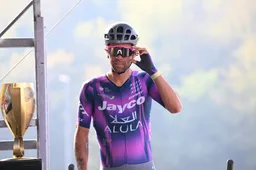
Sanremo, a world title and the yellow jersey: Michael Matthews escaped death - and that reignited his spark
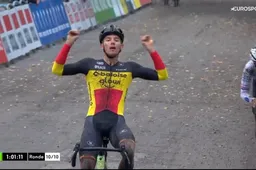
Unlike road colleagues Van der Poel or Van Aert, Nys rides twice as many cyclo-crosses: 'He doesn't want to ride only ten cyclo-crosses'
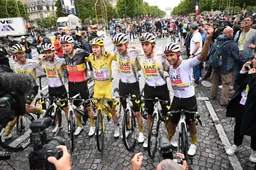
95 (or was it 97?) wins and a new record year, but losing that one race still hurts UAE Team Emirates - XRG

Former cyclocross world champion recalls wonderful memories of young Nys: "Back then we thought: that's not going to work out"

There was smoke so there was fire, but in 2026, how will Lidl-Trek make sure that fire doesn't flare up again?
Latest Cycling News
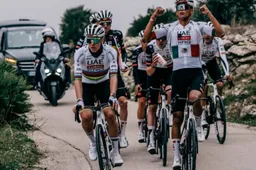
Pogacar and Del Toro to ride Tour de France, Almeida targets Giro and Vuelta: UAE lays out 2026 goals
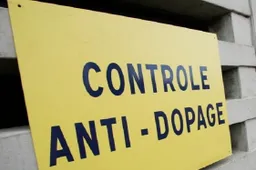
Bizarre doping case in Portugal concluded: team bosses heavy prison sentences, riders also punished
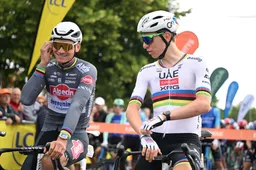
Museeuw and Merckx worried about Pogacar: 'Same lifestyle that contributed to Sagan's decline'
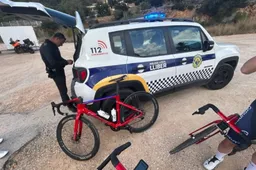
What a way to end theoff season.... Groupama-FDJ riders get tickets from spanish police at training camp
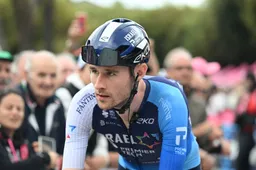
No INEOS after all? After painful split with IPT, Derek Gee might sign for different top team
Popular Cycling News

Museeuw and Merckx worried about Pogacar: 'Same lifestyle that contributed to Sagan's decline'

Cycling news at your fingertips: Follow IDL Procycling everywhere!

No INEOS after all? After painful split with IPT, Derek Gee might sign for different top team

Bizarre doping case in Portugal concluded: team bosses heavy prison sentences, riders also punished

What a way to end theoff season.... Groupama-FDJ riders get tickets from spanish police at training camp
Latest Comments
- Ah, the consequences of riding for Israel.Veganpotter11-12-2025
- Pidcock could follow everyone but Pogi while finishing 3rd. No second place rider this season😃Veganpotter16-11-2025
- Now the Palestinian protestors can stop their whining. Trump came to the rescue. So they can now STFU and go back to waving the rainbow flags.raufus15-10-2025
- Cracked the code lol. If it was that easy to 'crack the code' jonny Vegas would be charging up the Kwaremont giving Pog a dose of his medicine. Evenepoel can't match pog on a climb and neither can mvdp. Anything with a half difficult climb and Pog smashes the field. Even on flat(ish)parcours like Roubaix it came down to a mistake and crash by pog to definitively crown mvdp. MSR is the only one that Pog probably won't win.kevpt10-10-2025
- We've seen this movie before. I think Pogacar is doping.DeadBlow10-10-2025
- 👍Bea08-10-2025
- 👌🏻Bea08-10-2025
- What the data doesn't show is how much of an effect drafting had for evenepoel. Pogacar went with del toro at 100km whilst Evenepoel was still in the bunch. Despite the bike changes he still had a lot of assistance getting back to the bunch. Pogacar then rode 60km solo whilst evenepoel rode with Healy/Skjelmose until going solo in thd last 10-15km. Thats ~20% less power / energy requirements for 45-50km. Apples and oranges...kevpt30-09-2025
- 👏👏Bea24-09-2025
- Agreed! As we all know now, Juan Ayuso will be on another team. But it was sweet to see him win the stages at La Vuelta. I do love the drama of cycling admittedly but its clear to see the talent of winners of stages in a Grand Tourryhw2814fq921-09-2025
Loading

